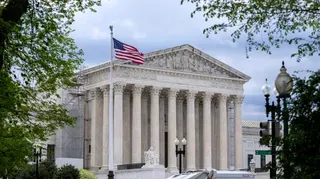March 14, 2012
Rutgers Webcam Spying Trial is Heading to Jury
Jason St. Amand READ TIME: 3 MIN.
NEW BRUNSWICK, N.J. (AP) - After nearly two weeks of testimony, the case that kick-started national conversations about gay youths and Internet privacy is going to a jury that must decide whether Dharun Ravi is a criminal or just a young man who was confused by seeing two men kiss.
Ravi, now 20, is accused of viewing a few seconds of his roommate's encounter with another man in their dorm room at Rutgers University and telling people about it in text messages, tweets and in person. He could face years in prison if convicted of charges including invasion of privacy and bias intimidation, a hate crime.
Lawyers gave their summations Tuesday in the case, which has gotten enormous attention since the events of September 2010, when the roommate, Tyler Clementi, jumped to his death from the George Washington Bridge.
The trial, which included testimony from about 30 witnesses over 12 days in addition to the closing arguments, focused on a few days in the dorm where Ravi and Clementi, both 18-year-olds from well-off New Jersey suburbs, were randomly assigned to be roommates for their first year at Rutgers.
Defense attorney Steven Altman told jurors that Ravi was surprised to turn on his webcam and see his roommate in an intimate situation with another man. He emphasized that there was no recording, no broadcast and no YouTube video of the Sept. 19, 2010, encounter.
And he said Ravi was not acting out of hatred of his roommate or gays in general when he saw the image from his webcam on the computer of another student.
"If there's hate in Dharun's heart, if there's ugliness in Dharun's heart, where's there some information and some evidence to support it?" Altman asked jurors.
Ravi tweeted and talked about what he saw, but Altman said he was only doing so because he was young, had never before seen men kissing and did not know what to do. He'd turned on the webcam in the first place, Altman said, because he was worried about what was happening in his room after seeing Clementi's guest, whom Ravi described as "older" and "sketchy."
His client, Altman said, was concerned about whether the stranger might take the iPad he'd left in the room.
Julia McClure, a prosecutor for Middlesex County, reminded jurors of testimony from some of Ravi's high school friends that even before Ravi moved into the dorm, he was concerned about having a gay roommate.
"He was so shocked that within about four minutes, he sent out a tweet, because he was seeking advice?" McClure asked. And, she said, there was evidence that he then told other students about what he'd seen and invited them to a friend's room where they could see for themselves.
The challenge for jurors could be deciding whether the laws apply to what Ravi is alleged to have done.
He faces 15 charges. Four are invasion of privacy and attempted invasion of privacy charges, where the required proof is that he saw or disseminated images - or attempted to - of private parts or sex acts, or a situation where someone might reasonably expect to see them.
Four charges allege bias intimidation. Ravi can be convicted of intimidation if he's also found guilty of an underlying invasion-of-privacy charge. Two of those charges are second-degree crimes punishable by up to 10 years in prison - the most significant penalties he faces if convicted.
Seven charges accuse him of trying to cover his tracks. Among the allegations: that he deleted and changed Twitter postings and text messages and told another witness what to say.
Clementi's death was one in a string of suicides by young gays around the country in September 2010 and became probably the best known. President Barack Obama commented on it in an online video, as did talk show host Ellen DeGeneres.
New Jersey lawmakers hastened passage of an anti-bullying law because of the case, and Rutgers changed housing policies to allow opposite-sex roommates in an effort to make a more comfortable environment for lesbian, gay, bisexual and transgender students.







